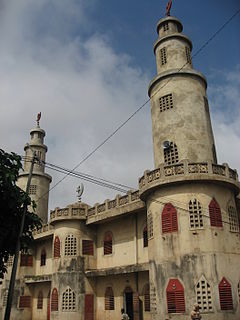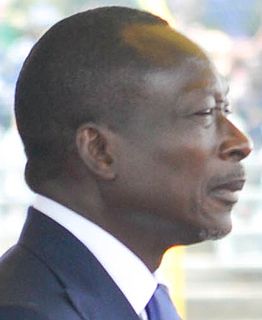The Republic of Benin was formed in 1960 when the colony of French Dahomey gained independence from France. Prior to this, the area that is now the Republic of Benin was divided largely between two coastal kingdoms, Dahomey and Porto-Novo, and a large area of various tribes in the north. The French assembled these various groups together into the colony of French Dahomey, which was part of the various colonies of French West Africa from 1904 until 1960. In the independence era, the republic was extremely unstable for the first decade and a half of existence, with multiple governments and multiple military coups. In 1972, Mathieu Kérékou led a military coup deposing the Presidential Council and appointing himself as the head of state, a position he held until 1991 when the country returned to multiparty elections. Since that point, the state has held multiple presidential and legislative elections and a number of different parties have become important.

The Politics of Benin take place in the framework of a presidential representative democratic republic, wherein the President of Benin is both head of state and head of government, and of a multi-party system. Executive power is exercised by the government. Legislative power is vested in both the government and the legislature. The Judiciary is independent of the executive and the legislature. The current political system is derived from the 1990 Constitution of Benin and the subsequent transition to democracy in 1991. The Economist Intelligence Unit has rated Benin as "hybrid regime" in 2016.

Elections in Benin take place within the framework of a multi-party democracy and a presidential system. Both the President and the National Assembly are directly elected by voters, with elections organised by the Autonomous National Electoral Commission (CENA).

The Communist Party of Benin is a political party in Benin. PCB was founded in 1977 by the Union of Communists of Dahomey. The party was initially called Communist Party of Dahomey. The first secretary of the party is Pascal Fantodji. PCB publishes La Flamme.
The Democratic Renewal Party is a political party of Benin led by Adrien Houngbédji. Houngbédji lived in exile for several years, but returned to Benin to take part in the National Conference of 1990. He built up his party largely around other exiled Beninese. PRD was legally recognized on September 24, 1990.

Borgou is one of the twelve departments of Benin. Borgou borders the country of Nigeria and the departments of Alibori, Atakora, Collines and Donga. The capital of Borgou is Parakou. The département of Borgou was bifurcated in 1999 with its northern territory moved to the newly created Alibori Department.
Adrien Houngbédji is a Beninese politician and the leader of the Democratic Renewal Party, one of Benin's main political parties. He was President of the National Assembly of Benin from 1991 to 1995, Prime Minister of Benin from 1996 to 1998, and President of the National Assembly again from 1999 to 2003. Beginning in 1991, he stood repeatedly as a presidential candidate; he placed second in 2006, but was heavily defeated by Yayi Boni in a second round of voting. Since 2015, he has served for a third time as President of the National Assembly.

Thomas Boni Yayi is a Beninese banker and politician who was President of Benin from 2006 to 2016. He took office after winning the March 2006 presidential election and was re-elected to a second term in March 2011. He also served as the Chairperson of the African Union from 29 January 2012 to 27 January 2013.

The unicameral National Assembly is Benin's legislative body.

The Benin Football Federation is the governing body of association football in Benin. It was founded in 1960, affiliated to CAF in 1963 and to FIFA in 1964. It organizes the national football leagues, including the Benin Premier League, and the national team.

The People's Republic of Benin was a socialist state located in the Gulf of Guinea on the African continent, which would become present-day Benin. The People's Republic was established on 30 November 1975, after the 1972 coup d'état in the Republic of Dahomey. It effectively lasted until 1 March 1990, with the adoption of a new constitution, and the abolition of Marxism-Leninism in the nation in 1989.
The Coalition for an Emerging Benin is a political party of Benin. In the parliamentary election held on 31 March 2007, the party won two out of 83 seats.
The Cowry Forces for an Emerging Benin is a political party of Benin, formed by supporters of president Yayi Boni. In the parliamentary election held on 31 March 2007, the party won 35 out of 83 seats. The party expanded its plurality to 41 seats in the 2011 election that followed the contested reelection of Yayi Boni as president.
Benin, officially the Republic of Benin, is a country in Western Africa. It borders Togo to the west, Nigeria to the east and Burkina Faso and Niger to the north; its short coastline to the south leads to the Bight of Benin. Its size is just over 110000 km2 with a population of almost 8500000. Its capital is the Yoruba founded city of Porto Novo, but the seat of government is the Fon city of Cotonou. About half the population live below the international poverty line of US$1.25 per day.

Presidential elections were held in Benin on 13 March 2011 after being postponed twice from 27 February and 6 March 2011. Incumbent President Yayi Boni ran for re-election against thirteen other candidates, including former National Assembly head and political veteran Adrien Houngbédji and Abdoulaye Bio-Tchané, president of the West African Development Bank. He won 53.18% of the vote, enough to win a second term without a run-off. It is the first time since the restoration of democracy in Benin that a candidate has won the presidency in a single round. A second round run-off would have been held on 27 March 2011 if it had been necessary.

Presidential elections were held in Benin on 6 March 2016, having been delayed by one week due to logistical constraints. Incumbent President Thomas Boni Yayi was at the end of his second presidential term and was constitutionally barred from running for a third. The elections grabbed the interest of many of the country's top businessmen, resulting in over 30 candidates running for the presidency. A second round was held on 20 March, in which businessman Patrice Talon defeated Prime Minister Lionel Zinsou.

Parliamentary elections are scheduled to be held in Benin on 28 April 2019.









